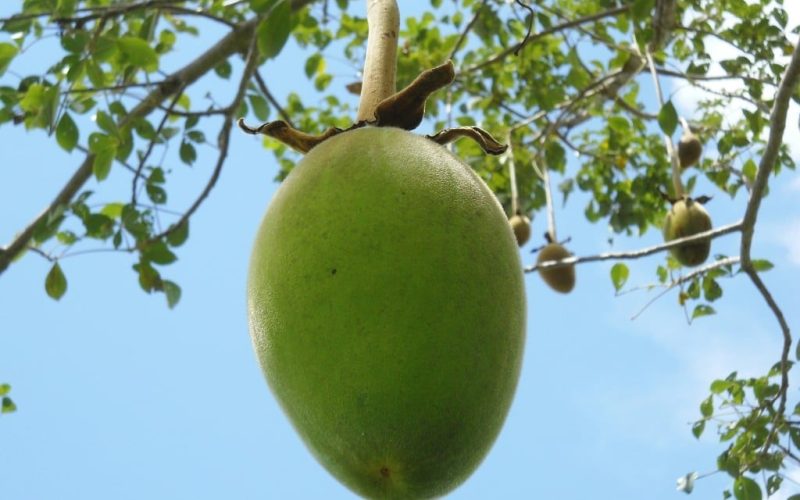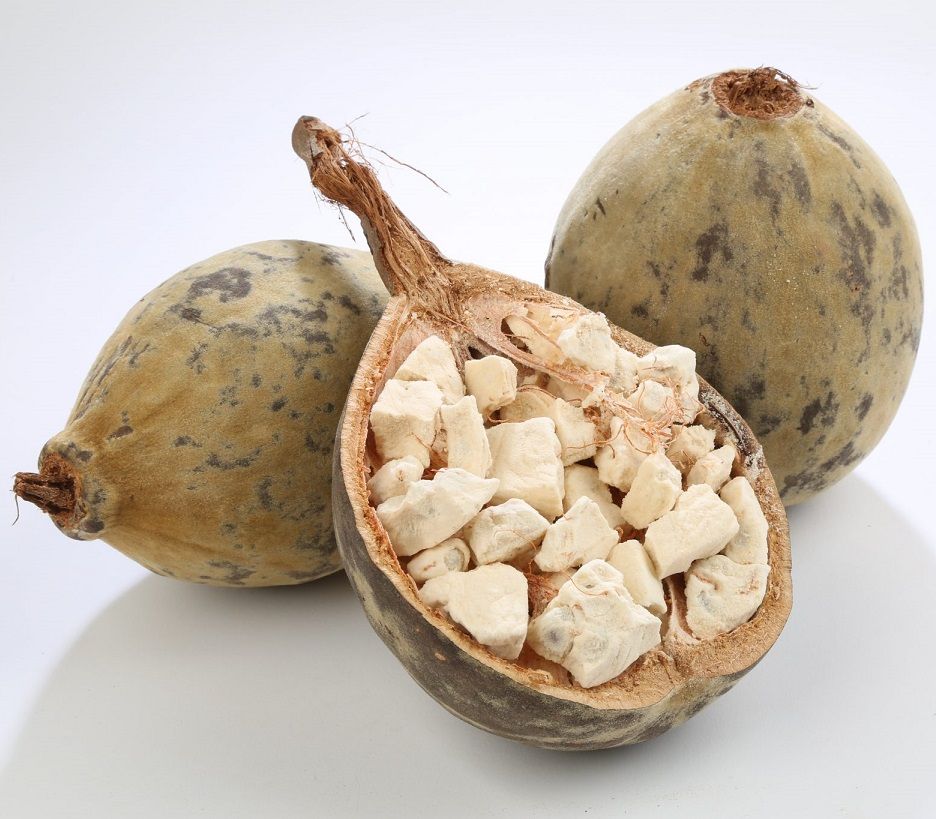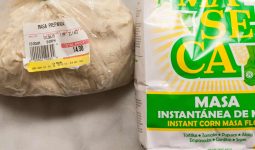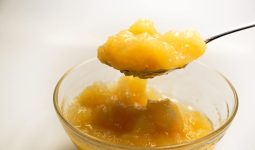The baobab fruit is widely found in tropical regions, including Madagascar, South Africa, Australia, and Botswana. It is a genus of deciduous trees with the scientific name adansonia.
This giant tree can grow as tall as 98 feet and produces large fruits with powdery pulp, which are said to contain high amounts of essential vitamins and minerals. The pulp, seeds, and leaves have been reported to hold many health benefits and are a staple in numerous cuisines and recipes.
What are the uses of baobab?
In regions where it is native to, the baobab tree is used for medicinal purposes to treat a number of illnesses, including asthma, diarrhea, fever, smallpox, and malaria.
Also, the baobab fruit has been used by traditional African medicine practitioners to curb inflammation. In recent times, manufacturers have begun adding baobab to energy drinks, juices, dietary supplements, and energy bars.
It has often been marketed as a superfruit as it is believed to be a rich source of antioxidants. For instance, the baobab fruit is sometimes said to be richer in vitamin c than most citrus fruits, including orange.
Furthermore, the baobab fruit is sometimes used as an ingredient in hair-care, body-care, and skincare products. Baobab oil – which is an extract from the seeds of the tree – is used in making these products.
What are the health benefits of baobab fruit and powder?
The nutritional content of baobab powder per 100g according to the US Department of Agriculture
| Water [g] | 10.92 |
| Energy [kcal] | 250 |
| Protein [g] | 3.69 |
| Total lipid (fat) [g] | 0.47 |
| Ash [g] | 5.28 |
| Carbohydrate, by difference [g] | 79.65 |
| Fiber, total dietary [g] | 44.5 |
| Sucrose [g] | 9.22 |
| Glucose (dextrose) [g] | 4.66 |
| Fructose [g] | 0.00 |
| Lactose [g] | 4.28 |
| Calcium, Ca [mg] | 342 |
| Iron, Fe [mg] | 8.42 |
| Magnesium, Mg [mg] | 158 |
| Phosphorus, P [mg] | 47 |
| Potassium, K [mg] | 2189 |
| Sodium, Na [mg] | 10 |
| Zinc, Zn [mg] | 0.92 |
| Selenium, Se [µg] | 0 |
| Vitamin C, total ascorbic acid [mg] | 173.2 |
| Thiamin [mg] | 0.03 |
| Riboflavin [mg] | 0.074 |
| Niacin [mg] | 19.98 |
| Vitamin B-6 [mg] | 2.414 |
| Folate, total | 43 |
| Folate, food | 43 |
| Fatty acids, total saturated [g] | 0.244 |
| Fatty acids, total polyunsaturated [g] | 0.163 |
| Fatty acids, total monounsaturated [g] | 0.169 |
Here are some of the potential health benefits of the baobab fruit.
Rich in many essential vitamins and minerals
Baobab is considered a rich source of many essential vitamins and minerals. Studies have revealed that the nutritional content of the baobab tree varies and is influenced by the geographical location where it was grown as well as the different parts of the plant such as the pulp, seeds, and leaves.
For instance, the pulp is rich in antioxidants, vitamin C, and several essential minerals like iron, magnesium, potassium, and zinc.
The leaves are rich in high-quality proteins and calcium, which can easily be digested.
Also, the seeds and kernel of the plant are packed with fiber, fat, and micronutrients like calcium, iron, and thiamine.
However, in most regions where you can’t find fresh baobab, the dried powdered form is most commonly seen. Powdered baobab also packs a punch in several essential nutrients but is particularly rich in potassium, iron, vitamin B6, and vitamin C.
High fiber content may improve digestive health and balance blood sugar levels.
Baobab is a good source of fiber; just one tablespoon (ten grams) of it’s powdered version can contain up to 18% of the required daily intake.
Fiber has been shown to be aid proper digestion as it passes through your gastrointestinal tract undigested.
It also acts as a prebiotic and promotes the growth of healthy bacterias in your gut and also helps in optimizing the health of your gut microbiome.
Some other studies show that increasing your fiber intake may also help to protect against conditions like hemorrhoids, intestinal ulcers, and inflammatory bowel disease.
Furthermore, the high fiber content of baobab fruit may also help slow the assimilation of sugar into the bloodstream, which can prevent fluctuations in blood sugar and stabilize sugar level for long terms.
May support weight loss by promoting feelings of fullness
If you’re looking to drop a few extra pounds, adding baobab to your diet may be beneficial. It can help reduce cravings and promote feelings of fullness, helping you eat less lose weight.
You can either consume the baobab fruit by making a smoothie out of it or as tea. It aids weight loss either way. It would also promote reduced feelings of hunger and therefore reduce your consumption of excess food.
Polyphenol and antioxidant content may reduce inflammation.
Baobab is loaded with antioxidants and polyphenols. These are compounds that shield your cells from oxidative damage and decrease inflammation in your body.
Inflammation could result in a lengthy list of health conditions, including heart disease, cancer, autoimmune disorders, and even diabetes, if not treated on time.
Positive results have been provided by several researchers on the use of baobab to treat inflammations in the body but are mostly limited to animal studies.
One study conducted in mice revealed that baobab extract reduced oxidative damage to cells and decreased levels of inflammation.
Another study also recorded that baobab fruit pulp contributed to a reduction in multiple markers of inflammation and increased heart protection against damage.
However, despite these feasible findings, more studies are still needed to determine how baobab may affect inflammation in humans.
Promotes heart health
The mineral content of the powered versions of baobab has been shown to lower blood pressure, and also improve blood circulation; these two things are essential to maintain a healthy heart and may also help to prevent heart disease and stroke.
High vitamin C content may promote skin health.
Vitamin C is a vital nutrient for the skin, and baobab happens to be loaded with vitamin C. The powder from baobab helps to increase the production of collagen in your skin. It also helps to keep your skin supple and wrinkle-free.
What are the potential side effects of baobab?
Though baobab is considered safe to consume, and it’s highly unlikely to result in any chronic reactions, there are some minor effects that should be considered.
Some studies have revealed that the seeds and pulp contain some antinutrients, such as tannins, oxalic acid, and phytates that can reduce nutrient availability and absorption.
However, the amount of these antinutrients in baobab is too low to cause complications for most people, especially if they follow a well-balanced diet that is rich in other healthy whole foods.
Also, some studies have shown that baobab oil contains some amounts of cyclopropenoid fatty acids, which may interfere with the synthesizing of fatty acid and may trigger health issues.
However, counter studies have revealed that these harmful compounds are unlikely to cause complications for most people as they are significantly reduced during processing.
Furthermore, there is no substantial evidence on the effect of baobab on pregnant women and breastfeeding mothers. Therefore, it is advised to take it in moderation and speak with your physician if you have any concerns or questions.
Final note
Baobab is a highly nutritious fruit that has been linked to a number of health benefits.
While some of the benefits have solid scientific backings, others are limited to animal studies, and more human testing is needed to understand how they react to the human body.
If you’re considering baobab for any chronic condition, beauty recipe, or weight loss remedy, do well to consult your physician before starting your supplement regimen, avoid self-treatment with baobab.









